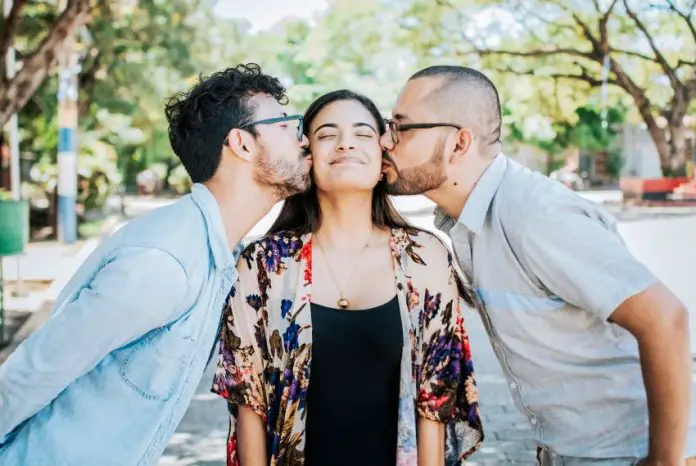Have you ever wondered if polyamorous marriage is legal in Mexico? Traditional Catholic values have strongly influenced how couples and families are formed in Latin American countries, including Mexico. For a long time, marriage was seen as the default way for people to be in a romantic or sexual relationship. Marriage was originally a solely religious practice, but in the late 1850s, President Benito Juárez separated the church from the government, making marriage a legal practice as well.
Because of these traditions, people were expected to get married in a heterosexual and monogamous relationship, to have children. However, Mexican society has changed a great deal in recent decades, allowing for different types of relationships to exist in the public eye. Same-sex marriage has been legal since 2015, and 10 states now allow same-sex couples to adopt children. This progress is thanks to groups and organizations that have advocated tirelessly for equal rights and families’ rights.

This new acceptance of diverse families in Mexico has opened up discussions about other types of relationships, like non-monogamy, or the practice having more than one partner, and polyamory, or loving more than one person at a time. In fact, a survey by Mexico Elige showed that at least 25% of Mexicans believe they can love more than one person at the same time.
In most countries, societal discussions of new ideas often lead to institutions stepping in to make things clearer. In April of this year, the Mexican Supreme Court (SCJN) made a decision regarding polyamory. Mexican society — even the law — is starting to accept different models of the family and relationships. This article will explain what the people who brought the case to court were asking for, what the Court decided, and how this decision could help make polyamorous relationships legally recognized.
What did the complainants ask for?
The plaintiffs argued that the way that marriage and cohabitation — living together without being married — are defined in the Civil Code of Puebla discriminates against polyamorous families because of their sexual orientation.

Since marriage and cohabitation are defined as legal agreements between only two people, polyamorous relationships are left out. The plaintiffs argued that this was discriminatory because it meant they do not receive the same protections as married or cohabitating relationships, like certain tax benefits, social security, or legal protections for their children.
If the plaintiffs had been right, the Court would have had to agree with them: the Mexican Constitution clearly says that people can’t be treated unfairly because of their sexual orientation. But that’s not what happened.
What did the Supreme Court decide?
Although the SCJN ruled against the plaintiffs, the Court made several important points in its ruling. First, it said that Puebla’s definition of marriage is not unfair based on sexual orientation because polyamory is not a sexual orientation: it’s a way of having relationships. This means that leaving polyamorous families out of marriage laws isn’t exactly the same as treating people unfairly because of who they love.
Even if the Court had agreed with the plaintiffs and removed the limit on the number of people in a marriage, it wouldn’t have fixed the problem: all the other rules about marriage, like divorce or child custody, are made for two people.

However, the Court did make a notable statement: polyamorous families should be treated equally by the government. The main thing all families share, the SCJN said, is “the existence of loving, sexual and supportive connections, as well as commitments among people who want to share a life together.” The right of Mexicans to form a family should be protected in all its different forms, not just for monogamous heterosexual couples.
The Court also recognized that Mexico’s current laws do not cover all kinds of families, such as polyamorous ones. But, the Court said, this doesn’t mean these families shouldn’t be protected by the government. On the contrary, this case shows that polyamorous families want to be protected by the law and provides an opportunity for lawmakers to create new rules that can do just that.
The Court also noted that the plaintiffs did not provide enough evidence to show that polyamory or other types of relationships have been treated unfairly in the past. To me, it seems like the Mexican Supreme Court is inviting the public to take action: if you want your family to be recognized, get organized and ask the government to protect your family through the law. The Court almost seems to be saying, “If anyone challenges this, I’ll be here to help,” hinting that polyamorous families need to make stronger arguments in the future and before their state legislatures.
April’s ruling is a positive sign for diverse families seeking protection from the government. The SCJN’s acknowledgment of polyamorous relationships and its definition — a type of intimate, loving, sexual and affectionate relationship involving more than two people, with knowledge, consent, honesty, respect, responsibility, non-possession and equality among its members, regardless of their gender — is a green light for these families.
More signs of change
Just last year, the Ministry of Public Education (SEP) introduced new textbooks for elementary and middle school students that showed different kinds of families, like families with two dads, two moms, no children or adopted children, among others. This led to lots of discussions about what a family really is, with many people agreeing that a family is simply a group of people with loving bonds who choose to share their lives together, reflecting how Mexican values are changing to accept and respect different ways people can be in relationships.
Another important development is that more people are getting organized to be seen and heard. Groups like Poliamor en México connect polyamorous people so they can share their experiences. More and more podcasts and social media accounts centered around non-monogamy and polyamory are popping up, including Rico y bonito and Gotitas de poliamor, among others. People in Mexico are realizing that while a monogamous marriage is one valid and unique way to be in a relationship, there are other ways to build a life that are just as valid.
Ceci is a lawyer who grew up in Monterrey and has lived in Mexico City since 2013. She is passionate about the Mexican culinary and music scene, taking great pride in her country’s cultural contributions to the world.
